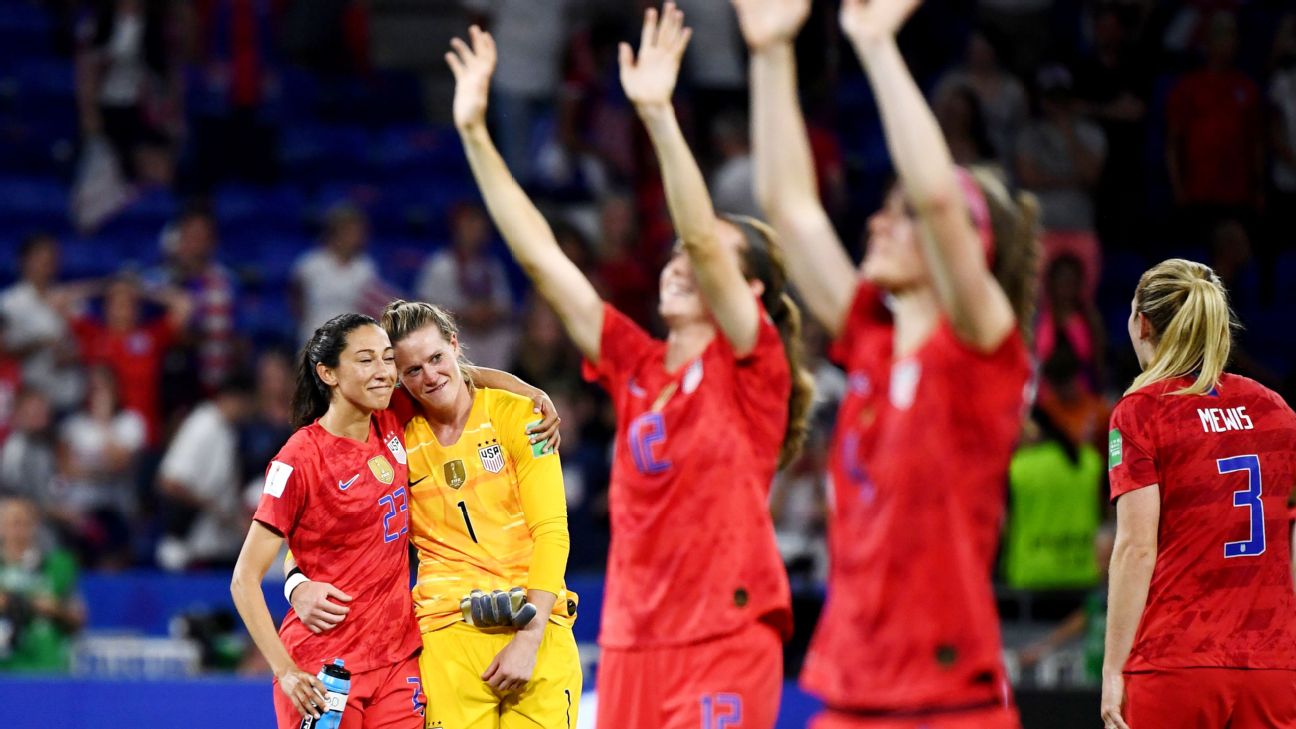

LYON, France — Looking to capitalize on the success of a Women’s World Cup that he said drew more than 1 million spectators and 1 billion television viewers, FIFA president Gianni Infantino used the tournament’s final weekend to propose a five-point plan to grow women’s soccer.
That growth starts with expanding the Women’s World Cup from 24 to 32 teams.
“It’s up to us to make sure we seize this opportunity,” Infantino said Friday at FIFA’s closing news conference, “and we do something about it.”
– FIFA Women’s World Cup: All you need to know
– Full Women’s World Cup fixtures schedule
The first three of Infantino’s proposals, which he said he will submit to the FIFA Council and the organization’s member associations, involve creating more showcases for the sport at its highest level.
Infantino said he would like to expand the World Cup field to 32 teams as soon as possible, even if that means reopening the bidding process now underway for the 2023 World Cup. Australia and Japan are widely seen as the favorites among the countries to express interest.
The Women’s World Cup expanded from 16 to 24 teams in 2015.
Beyond the World Cup, Infantino reiterated interest in two more ideas for global competitions: a women’s version of the Club World Cup and a women’s world league involving national teams.
He said he would like the Club World Cup to begin as soon as the next year or two, although he offered no specifics for such a quick timeline beyond a desire to include teams from every confederation. Fully professional women’s club teams are still as much the exception as the rule in Asia, Europe and North America, and almost nonexistent elsewhere in the world.
“We can develop national team football only if we develop club football as well, all over the world, not only in a few countries,” Infantino said. “So we need a Club World Cup, which can be played every year to expose clubs from all over the world. And to make clubs, men’s clubs but also women’s clubs, invest even more in women’s football.”
A world league, involving promotion and relegation for national teams competing in different strata of the competition, is also not a new idea from Infantino. He suggested it publicly in 2017 but said Friday that it proved logistically infeasible to act at the time without adjustments to the international match calendar for the women’s game.
The fourth proposal involved prize money for the 2023 Women’s World Cup.
“Moving ahead for the next World Cup, we will double it,” Infantino said. “I am very confident that we can achieve the necessary figures in order to do that.”
The prize money for the 2019 World Cup is $30 million, compared to $400 million for last year’s Men’s World Cup. France, winner of that tournament, received nearly 10 times what the winner of Sunday’s final in Lyon will take home.
Infantino’s final proposal dealt with the game at all levels. Having already pledged to invest $500 million in the women’s game over the next four years, the president said Friday that FIFA will double that to a total of $1 billion in the same time span.
He suggested some of that could be used for events like the global competitions he proposed, but that it would also go to grassroots efforts around the world.
“The reserves that FIFA has are at [an] unprecedented high level,” Infantino said. “We have more than $2.7 billion reserves. We don’t need all this money in the Swiss banks. The Swiss banks have enough money. We can use some of it. And I will certainly ask that some of it will be reallocated for the development of women’s football.”
Infantino was also asked about the U.S. team, which has been in the spotlight throughout the tournament for both its success on the field in reaching a third consecutive final and off the field for issues ranging from goal celebrations to gender equality and White House visits.
“I think in general everybody is free to express their personal point of view in whichever way they want to,” Infantino said through translation. “When there is a World Cup, regarding football, well then you have to focus on football. Yes, we can celebrate some of these other subjects, topics. We can be thrilled about certain successes. But I think we should also remain respectful for things.
“I think we have to say that the WWC is an extraordinary platform to promote women’s equality, to promote all sorts of topics that can discussed in different kinds of forums. … To talk about politics may be going a little too far.”
